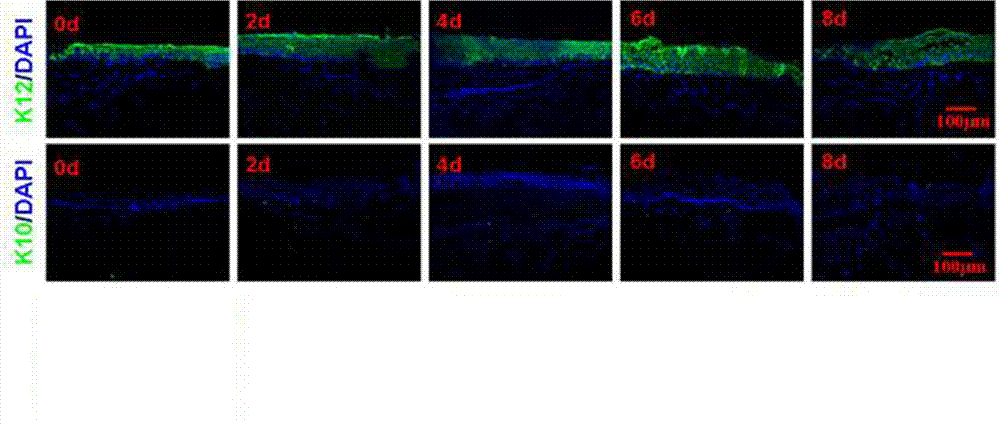Preservation method for corneal limbus tissue
A preservation method and corneal limbal technology, applied in the preservation, application, animal husbandry and other directions of human or animal body, can solve the problems of loss of epithelium, damage to the basement membrane, limiting the clinical application of limbal active tissue, etc. Active, simple production process effect
- Summary
- Abstract
- Description
- Claims
- Application Information
AI Technical Summary
Problems solved by technology
Method used
Image
Examples
Embodiment 1
[0045] The preparation method of the present invention comprises the following steps: the residual corneal limbal tissue after the corneal transplantation of the dead eyeball is cleaned with sterile physiological saline in a sterile and clean environment, and then disinfected. Fresh corneal limbal tissue is soaked and rinsed with antibiotic-containing phosphate buffered saline for 5-10 minutes, rinsed at least 3 times, each time greater than or equal to 5 minutes; the operator wears sterile gloves on both hands, and removes the conjunctiva and iris with microscopic instruments tissue, put the sterile transwell chamber in a sterile cell culture dish with a diameter of 35mm, spread the corneal limbal tissue on the PVDF membrane of the transwell chamber; Contact; place the cell culture dish in the refrigerator to keep the ambient temperature constant at 4°C, and replace with fresh sterile medium-term preservation solution every 2 days. In this embodiment, the PVDF film is a speci...
Embodiment 2
[0047] The preparation method of the present invention comprises the following steps: the residual corneal limbal tissue after the corneal transplantation of the dead eyeball is cleaned with sterile physiological saline in a sterile and clean environment, and then disinfected. Fresh corneal limbal tissue is soaked and rinsed with antibiotic-containing phosphate buffered saline for 5-10 minutes, rinsed at least 3 times, each time greater than or equal to 5 minutes; the operator wears sterile gloves on both hands, and removes the conjunctiva and iris with microscopic instruments tissue, put the sterile transwell chamber in a sterile cell culture dish with a diameter of 35mm, spread the corneal limbal tissue on the PVDF membrane of the transwell chamber; Contact; place the cell culture dish in an incubator, keep the ambient temperature constant at 37°C, and replace with fresh sterile medium-term preservation solution every 2 days. In this embodiment, the PVDF film is a specific i...
Embodiment 3
[0049] The preparation method of the present invention comprises the following steps: the residual corneal limbal tissue after the corneal transplantation of the cadaveric source eyeball is washed with sterile physiological saline to clean the blood stains on the surface, and then disinfected. Fresh corneal limbal tissue is soaked and rinsed with antibiotic-containing phosphate buffered saline for 5-10 minutes, rinsed at least 3 times, each time greater than or equal to 5 minutes; the operator wears sterile gloves on both hands, and removes the conjunctiva and iris with microscopic instruments tissue, put the sterile transwell chamber in a sterile cell culture dish with a diameter of 35 mm, spread the corneal limbal tissue on the PVDF membrane of the transwell chamber; add SHEM medium at the bottom of the transwell chamber until the liquid level is fully covered with the PVDF membrane Contact; place the cell culture dish in a refrigerator to keep the ambient temperature constan...
PUM
 Login to View More
Login to View More Abstract
Description
Claims
Application Information
 Login to View More
Login to View More - R&D
- Intellectual Property
- Life Sciences
- Materials
- Tech Scout
- Unparalleled Data Quality
- Higher Quality Content
- 60% Fewer Hallucinations
Browse by: Latest US Patents, China's latest patents, Technical Efficacy Thesaurus, Application Domain, Technology Topic, Popular Technical Reports.
© 2025 PatSnap. All rights reserved.Legal|Privacy policy|Modern Slavery Act Transparency Statement|Sitemap|About US| Contact US: help@patsnap.com



